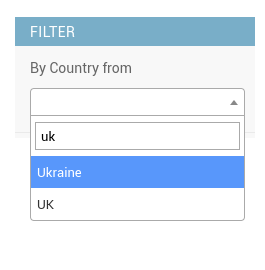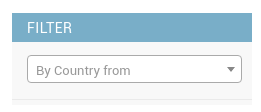dal_admin_filters
Django-autocomplete-light filters for django admin.
default select2 widget

widget with title as placeholder

Requirements
This is extension for django-autocomplete-light so you need to install and configure it too.
Here will be minimum setup for example.
Refer to http://django-autocomplete-light.readthedocs.io/ for more detailed instructions.
Installation
-
Install using pip
pip install django-autocomplete-light dal_admin_filters
-
Update INSTALLED_APPS, you need too put django-autocomplete-light before admin
INSTALLED_APPS = [
'dal',
'dal_select2',
'dal_admin_filters',
'django.contrib.admin',
... other stuff there ...
]
Configuration
-
Create autocomplete view
-
Let our models look like this
class Country(models.Model):
name = models.CharField(max_length=100, unique=True)
def __str__(self):
return self.name
class Person(models.Model):
name = models.CharField(max_length=100, unique=True)
from_country = models.ForeignKey(Country)
def __str__(self):
return self.name
-
Then autocomplete view for country selection will be similar to next
from dal import autocomplete
from your_countries_app.models import Country
class CountryAutocomplete(autocomplete.Select2QuerySetView):
def get_queryset(self):
if not self.request.user.is_authenticated():
return Country.objects.none()
qs = Country.objects.all()
if self.q:
qs = qs.filter(name__istartswith=self.q)
return qs
-
Register view in urls.py
from your_countries_app.views import CountryAutocomplete
urlpatterns = [
url(
r'^country-autocomplete/$',
CountryAutocomplete.as_view(),
name='country-autocomplete',
),
url(r'^admin/', admin.site.urls),
]
-
Use filter in your admin.py
from django.contrib import admin
from your_countries_app.models import Country, Person
from dal_admin_filters import AutocompleteFilter
@admin.register(Country)
class CountryAdmin(admin.ModelAdmin):
pass
class CountryFilter(AutocompleteFilter):
title = 'Country from'
field_name = 'from_country'
autocomplete_url = 'country-autocomplete'
class CountryPlaceholderFilter(AutocompleteFilter):
title = 'Country from'
field_name = 'from_country'
autocomplete_url = 'country-autocomplete'
is_placeholder_title = True
class CountryCustomPlaceholderFilter(AutocompleteFilter):
title = 'Country from'
parameter_name = 'from_country'
autocomplete_url = 'country-autocomplete'
widget_attrs = {
'data-placeholder': 'Filter by country name'
}
@admin.register(Person)
class PersonAdmin(admin.ModelAdmin):
class Media:
pass
list_filter = [CountryFilter]
If setup is done right, you will see the Select2 widget in admin filter in Person's changelist view.
Define dependencies between filters (forward)
-
Define forwards in the filter (example from the demo_project)
from dal import forward
class PersonFilter(AutocompleteFilter):
autocomplete_url = 'person-autocomplete'
title = 'Owner'
field_name = 'owner'
forwards = [
forward.Field(
'from_country__id__exact',
'country_id'
)
]
Read more at https://django-autocomplete-light.readthedocs.io/





